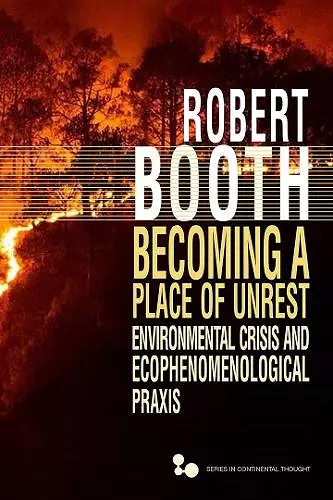Becoming a Place of Unrest
Environmental Crisis and Ecophenomenological Praxis
Format:Hardback
Publisher:Ohio University Press
Published:7th Sep '21
Currently unavailable, and unfortunately no date known when it will be back

The key to mitigating the environmental crisis isn’t just based on science; it depends upon a profound philosophical revision of how we think about and behave in relation to the world.
Our ongoing failure to interrupt the environmental crisis in a meaningful way stems, in part, from how we perceive the environment-what Robert Booth calls the "more-than-human world.” Anthropocentric presumptions of this world, inherited from natural science, have led us to better scientific knowledge about environmental problems and more science-based-yet inadequate-practical “solutions.” That’s not enough, Booth argues. Rather, he asserts that we must critically and self-reflexively revise how we perceive and consider ourselves within the more-than-human world as a matter of praxis in order to arrest our destructive impact on it.
Across six chapters, Booth brings ecophenomenology-environmentally focused phenomenology-into productive dialogue with a rich array of other philosophical approaches, such as ecofeminism, new materialism, speculative realism, and object-oriented ontology. The book thus outlines and justifies why and how a specifically ecophenomenological praxis may lead to the disruption of the environmental crisis at its root.
Booth’s observations and arguments make the leap from theory to practice insofar as they may influence how we fundamentally grasp the environmental crisis and what promising avenues of practical activism might look like. In Booth’s view, this is not about achieving a global scientific consensus regarding the material causes of the environmental crisis or the responsible use of “natural resources.” Instead, Booth calls for us to habitually resist our impetus to uncritically reduce more-than-human entities to “natural resources” in the first place.
As Booth recognizes, Becoming a Place of Unrest cannot and does not tell us how we should act. Instead, it outlines and provides the basic means by which to instill positive and responsible conceptual and behavioral relationships with the rest of the world. Based on this, there is hope that we may begin to develop more concrete, actionable policies that bring about profound and lasting change.
“In Becoming a Place of Unrest, Robert Booth builds on the insights of ecofeminists, new materialists, and (especially) phenomenologists to develop an original and highly compelling environmental philosophy. The book is not just an exemplary work of ecophenomenology; it is, more generally, an important contribution to environmental thought.” - Simon P. James, author of Environmental Philosophy: An Introduction An important contribution to the field of environmental humanities, as its breadth engages current intellectual strands and theories ranging from environmental philosophy to ecofeminism, new materialism, object-oriented-ontology (OOO) and speculative realism. The dialogue between the aforementioned terrains flourishes as [Booth] highlights the nature of the various relationships between the human and more-than-human world. - Nikoleta Zampaki (Journal of Phenomenological Psychology) A profound and original contribution to the field. [Robert Booth] makes a compelling case for the complicity of naturalism in the current environmental crisis and for radical reflection as a salve for reducing violence and environmental degradation. I highly recommend this work to scholars and readers interested in ecophenomenology and related fields. The text would be an excellent and timely edition to upper level undergraduate and graduate courses on ecophenomenology, environmental ethics, and related subjects. - Robert H. Scott (Environmental Values)
ISBN: 9780821424568
Dimensions: unknown
Weight: unknown
288 pages